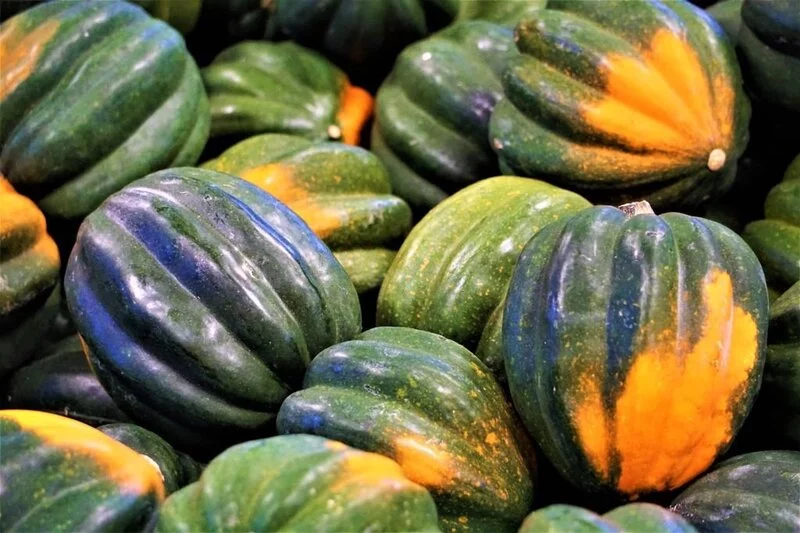Step right in, culinary enthusiasts, because today we’re talking about a staple ingredient in your autumn and winter recipes – the Acorn Squash! This vibrant, nutty-flavored gourd is a favorite in many kitchens for its versatility. But before you begin whipping up your favorite squash soup or side dish, it’s crucial to ensure that your acorn squash is fresh and healthy.
After all, a rotten squash can not only ruin your carefully planned meal but also pose health risks. So, let’s equip you with the know-how to identify a fresh acorn squash and spot the signs when it has gone bad.
Characteristics of a Fresh Acorn Squash
Picture a healthy acorn squash in your mind. What do you see? It’s likely a deep green, glossy exterior with smooth skin and no visible blemishes. This outer beauty is the first sign of a fresh acorn squash. The skin of a fresh acorn squash is hard, which means it should resist puncturing if you try to pierce it with your fingernail.
But the goodness of an acorn squash doesn’t stop at its exterior. Pick up the squash; it should feel dense and heavy for its size. That’s a sign of a fully mature squash, filled with sweet, rich flesh, ready to be turned into your next culinary masterpiece.
In the next sections, we’ll dive deeper into the signs of a bad acorn squash and how to store it properly to extend its shelf life. So stay tuned, because this knowledge will surely make you a squash savvy home cook!
Signs of a Bad Acorn Squash
Imagine picking up a squash from your kitchen counter, only to find it soft and squishy. Not the pleasant surprise you were hoping for, right? Soft spots or a squishy feeling when you press the skin of the acorn squash is one of the key indicators that it’s past its prime.
In addition, keep an eye out for any visible mold, which can appear as white, green, or black fuzzy spots. This is nature’s ‘do not eat’ sign and means that the squash has begun to decompose.
Lastly, an unpleasant, off smell can also be a giveaway that your squash has gone bad. Remember, a fresh acorn squash should have a mild, earthy scent. Anything too strong or sour is a no-go.
How to Store Acorn Squash Properly
Storing acorn squash properly is a game-changer. It can be the difference between having a tasty squash ready for your recipe and discovering a rotten mess in your pantry.
Acorn squash is pretty hardy and doesn’t require any fancy storage techniques. It prefers a cool, dark place with good ventilation. A pantry or a cellar works wonders. Just remember not to store it near apples or pears, as these fruits release a gas that can cause the squash to spoil faster.
You don’t need to refrigerate whole acorn squash. However, once it’s cut, wrap the pieces in plastic wrap and store them in the fridge. They should be good for about a week.
Mastering the art of recognizing the signs of a bad acorn squash and knowing how to store it properly is your ticket to avoiding food waste and ensuring you always have fresh, delicious squash ready for your recipes. So keep these tips in mind, and let’s continue our acorn squash journey!
Frequently Asked Questions About Acorn Squash
While we’re on our acorn squash journey, it’s natural to have a few questions popping up. So let’s tackle some of the common queries you might have about this delightful gourd.
How long can acorn squash last?
A whole acorn squash stored properly can last up to 2-3 months. But once cut, it’s best used within a week when stored in the fridge.
Do I have to refrigerate my acorn squash?
No, you don’t need to refrigerate whole acorn squash. But remember, once it’s cut, pop those pieces in the fridge!
I’ve found a small soft spot on my acorn squash. Can I still use it?
If the rest of the squash seems fine, you can cut out the small soft area and use the rest. But remember, when in doubt, it’s safer to discard the squash.
Conclusion
And that’s the end of our acorn squash adventure! We’ve taken you from the key characteristics of a fresh acorn squash to the signs of a bad one, and how to store it just right. With these tips and tricks up your sleeve, you’re well on your way to being an acorn squash superstar. So embrace your newfound knowledge and cook with confidence knowing that your squash is fresh and ready to be transformed into delicious meals. Remember, a little observation and care can go a long way in ensuring the freshness and taste of your acorn squash.




